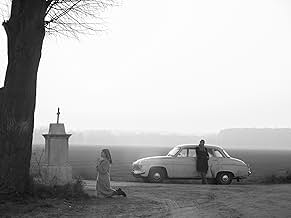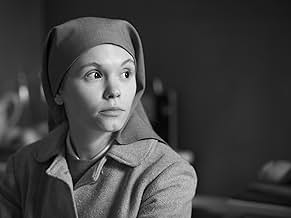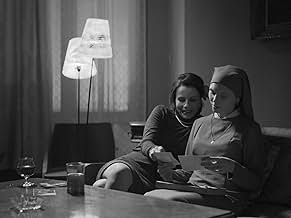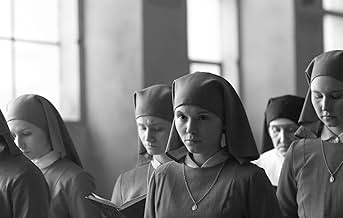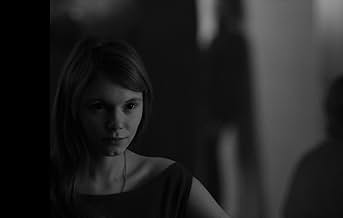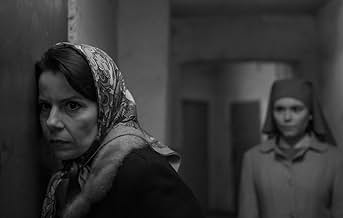VALUTAZIONE IMDb
7,4/10
62.273
LA TUA VALUTAZIONE
Ambientato nella Polonia degli anni '60, la giovane novizia Anna sta per prendere i voti quando scopre un oscuro segreto riguardante la sua famiglia che risale agli anni dell'occupazione ted... Leggi tuttoAmbientato nella Polonia degli anni '60, la giovane novizia Anna sta per prendere i voti quando scopre un oscuro segreto riguardante la sua famiglia che risale agli anni dell'occupazione tedesca.Ambientato nella Polonia degli anni '60, la giovane novizia Anna sta per prendere i voti quando scopre un oscuro segreto riguardante la sua famiglia che risale agli anni dell'occupazione tedesca.
- Regia
- Sceneggiatura
- Star
- Vincitore di 1 Oscar
- 70 vittorie e 92 candidature totali
Natalia Lange
- Bronia
- (as Natalia Lagiewczyk)
Jan Wojciech Poradowski
- Father Andrew
- (as Jan Wociech Poradowski)
Recensioni in evidenza
Ida was a dark somber tragic story expressed perfectly in film.
I am not a big fan of black and white "art" movies done for effect, except the old black and white movies, but Ida was filmed so perfectly, and the stark black and white was so integral to the story and feeling of the movie it was really perfect.
I am not a big fan of jazz either, but again, the choice of Coltrane's jazz music for parts of this film really let you feel what jazz is all about, it was beautiful.
The story was of an orphan nun who is preparing to take her final vows to God. The Mother Superior calls her in and tells her about who she is. Ida grew up not knowing her name or anything about her family. Ida finds that she has an aunt nearby and is told to go to see her before taking her vows.
The slow, heavy and deliberate pace of the movie express the story so perfectly, and there is no pandering or cheap shots, the movie is beautifully done. This is a story that is not for everyone, or every time, but I am glad it was made and that I saw it.
I have to give it a 10/10 for pure craftsmanship and cinematic perfection.
I am not a big fan of black and white "art" movies done for effect, except the old black and white movies, but Ida was filmed so perfectly, and the stark black and white was so integral to the story and feeling of the movie it was really perfect.
I am not a big fan of jazz either, but again, the choice of Coltrane's jazz music for parts of this film really let you feel what jazz is all about, it was beautiful.
The story was of an orphan nun who is preparing to take her final vows to God. The Mother Superior calls her in and tells her about who she is. Ida grew up not knowing her name or anything about her family. Ida finds that she has an aunt nearby and is told to go to see her before taking her vows.
The slow, heavy and deliberate pace of the movie express the story so perfectly, and there is no pandering or cheap shots, the movie is beautifully done. This is a story that is not for everyone, or every time, but I am glad it was made and that I saw it.
I have to give it a 10/10 for pure craftsmanship and cinematic perfection.
Whereas Jacques Rivette's despairing 'La Religieuse' had been shot in incongruously pretty sixties Eastmancolor, this laconic but wryly good-humoured female road movie - like Ingmar Bergman's Persona' - gains much of it's seductive visual impact from being shot in coolly glacial monochrome that looks like what you'd have got if Vermeer had worked in charcoal.
Similarly, like the Scandinavian good looks of Liv Ullman and Bibi Andersson in Bergman's film, 'Ida' is fascinating to watch throughout simply for the strong Polish features of Agata Kulesza as the chain-smoking 'Red Wanda' and the button eyes of Agata Trzebuchowska in the title role.
Similarly, like the Scandinavian good looks of Liv Ullman and Bibi Andersson in Bergman's film, 'Ida' is fascinating to watch throughout simply for the strong Polish features of Agata Kulesza as the chain-smoking 'Red Wanda' and the button eyes of Agata Trzebuchowska in the title role.
Ida is magnificent, it will stay with me a long time. The narrative is powerfully compelling and yet if it had been a non-narrative film I would have been spellbound by the images alone. They should make a coffee table book of stills from it. Huge emotional issues are dealt with in a remarkably understated, unsentimental, but appropriate way. The use of music (often my pet peeve in these days of Hollywood formula) is enlightened and illustrative. I don't think the ending is ambiguous, I'm not sure the writer who wrote that understood it. Perhaps there is something slightly facile about the way things wrap up in the last 15 minutes of the film, but this is only in comparison with how beautifully they are laid out before that. Enough, this is not really a review, it is an exhortation - Go see Ida!
simplicity, great photographs, splendid script. at first sigh, an old fashion movie. in fact, wise manner to use the legacy of impressive tradition and a great director who use, in same measure, with same precision, tension, poetry of images, atmosphere of period, cultural roots. it is a reflection occasion about origins, truth, faith and choices. a profound Polish story who reflects the identity search of an entire continent. it is , certainly, a rare gem. the cause is not only beauty of photography or admirable acting but a special flavor who remains after its end as a delicate feeling. a young woman and the courage to become here self. that is all. in skin of seductive music.
10Red-125
Ida (2013) is a Polish film co-written and directed by Pawel Pawlikowski. This brilliant film follows a few days in the life of Anna, a young novitiate nun. Anna has been raised in a convent, and she plans to take her vows and stay in the convent for the rest of her life.
However, before this can take place, the mother superior sends her to meet her only living relative, a woman named Wanda.
The pair could not be less similar. Ida is quiet, gentle, thoughtful, and shy. Her aunt is tough as nails--she has real power as a judge, and she knows how to use it. She's a heavy drinker and a heavy smoker. She's also a Jew.
In the first few minutes of the movie, Anna learns that she's Jewish. As a very young girl, she was taken to the convent, where the nuns raised her. (Her real name is Ida, which is why that's the title of the film.)
Wanda and Anna set out to return to their rural home, to solve the mystery of what happened to their family 20 years earlier. Why did Ida survive, when her family--other than Wanda--did not?
This film, shot in black & white, is superbly constructed on every dimension. The plot is tight, and the acting is incredible. Agata Kulesza (Wanda) and Agata Trzebuchowska (Anna/Ida), are immensely talented actors.
The cinematography is incomparable. My wife and I felt as if any frame--from the beginning to the end of the movie--would make a great still photograph.
Pawlikowski knows how to focus on his main actors, but he also lets us know that, while the protagonists are involved in heartbreaking drama, the rest of the world is going about its business around them.
This is a grim film. Anna's life is restricted by her piety. Wanda's life is constricted by alcohol and--it would appear--by lack of any close personal relationships. Everyone in Poland is restricted by horrible memories, dark secrets, and Soviet domination.
Grim or not, this is a film you shouldn't pass up if you care about great cinema. We saw it on a large screen at the LittleTheatre in Rochester, NY. However, it will work well enough on DVD. Don't miss it.
However, before this can take place, the mother superior sends her to meet her only living relative, a woman named Wanda.
The pair could not be less similar. Ida is quiet, gentle, thoughtful, and shy. Her aunt is tough as nails--she has real power as a judge, and she knows how to use it. She's a heavy drinker and a heavy smoker. She's also a Jew.
In the first few minutes of the movie, Anna learns that she's Jewish. As a very young girl, she was taken to the convent, where the nuns raised her. (Her real name is Ida, which is why that's the title of the film.)
Wanda and Anna set out to return to their rural home, to solve the mystery of what happened to their family 20 years earlier. Why did Ida survive, when her family--other than Wanda--did not?
This film, shot in black & white, is superbly constructed on every dimension. The plot is tight, and the acting is incredible. Agata Kulesza (Wanda) and Agata Trzebuchowska (Anna/Ida), are immensely talented actors.
The cinematography is incomparable. My wife and I felt as if any frame--from the beginning to the end of the movie--would make a great still photograph.
Pawlikowski knows how to focus on his main actors, but he also lets us know that, while the protagonists are involved in heartbreaking drama, the rest of the world is going about its business around them.
This is a grim film. Anna's life is restricted by her piety. Wanda's life is constricted by alcohol and--it would appear--by lack of any close personal relationships. Everyone in Poland is restricted by horrible memories, dark secrets, and Soviet domination.
Grim or not, this is a film you shouldn't pass up if you care about great cinema. We saw it on a large screen at the LittleTheatre in Rochester, NY. However, it will work well enough on DVD. Don't miss it.
Lo sapevi?
- QuizPawel Pawlikowski had such difficulty finding an actress to play the titular character that he asked his friends to take secret photographs if they saw anyone who was in the right ballpark of the character. One of his friends, director Malgorzata Szumowska, saw Agata Trzebuchowska in a Warsaw café, took the picture and persuaded her to audition. She agreed to meet with Pawlikowski because she was a fan of his film My Summer of Love (2004).
- BlooperWhen Ida is in a church, the priest seems to be getting ready to say Mass and we see a versus populum altar, which didn't become the norm until years later after Vatican II. The movie takes place in 1961 and the priest would have been saying Mass on the high altar.
- ConnessioniFeatured in 72nd Golden Globe Awards (2015)
- Colonne sonoreSerduszko puka w rytmie cha-cha
Music by Romuald Zylinski
Lyrics by Janusz Odrowaz-Wisniewski
Performed by Maria Koterbska
I più visti
Accedi per valutare e creare un elenco di titoli salvati per ottenere consigli personalizzati
- How long is Ida?Powered by Alexa
Dettagli
Botteghino
- Budget
- 1.000.000 USD (previsto)
- Lordo Stati Uniti e Canada
- 3.827.060 USD
- Fine settimana di apertura Stati Uniti e Canada
- 55.438 USD
- 4 mag 2014
- Lordo in tutto il mondo
- 11.156.836 USD
- Tempo di esecuzione
- 1h 22min(82 min)
- Colore
- Mix di suoni
- Proporzioni
- 1.37 : 1
Contribuisci a questa pagina
Suggerisci una modifica o aggiungi i contenuti mancanti



